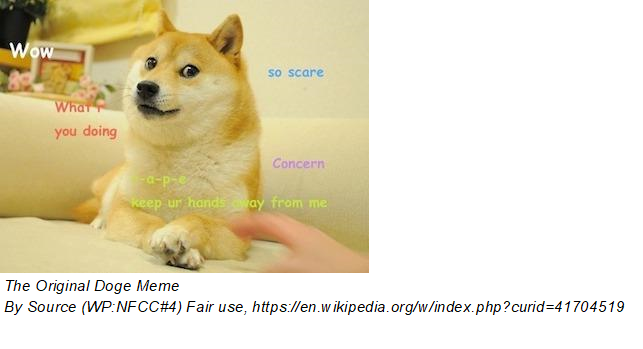Much Wow
The Linguistics of Doge
Amidst claims from purists that the online community is committing a collective English language genocide, some rather inventive language patterns champion the rights of writers and speakers to toy with a living language.
Many of these new constructions and phrases, which fly in the face of “correct” English, are popularised by memes. Far from simple jokes, memes operate within a highly intertextual semiotic field driven by user participation. With each new iteration of a meme, the image is spread to a wider audience and the accompanying text becomes known and accepted.
Thanks to memes, we can greet someone’s pet by saying “what a good doggo” where we might once have said “what a good doggie” or “what a good dog.” We can also let the pet owner know we’re having a hard time “adulting today because reasons.” If the person we’re speaking to is an avid internet user, they will have no issue with the structure of the sentence and will understand it immediately.
In today’s post, I’d like to look at one popular meme that has had an impact on both online and offline discourse: doge.
The doge meme we all know and love today is an amalgamation of random internet happenings. In 2010, a Reddit user commented “LMBO LOOK @ THIS FUKKIN DOGE” on an image of a corgi. That same year, a Japanese woman named Sato began posting images of Kabosu, her Shiba Inu dog, on her blog.
Three years later Sato was “taken aback” to see her dog’s face plastered all over the internet with much comic sans on her original image. Her dog had become the doge of the internet.
There is no commonly agreed pronunciation of doge. But after completing a very informal survey, I found that native English speakers seem to favour /oʊ/ as in “code” with a soft ‘g.’ The /oʊ/ is a natural step as the non-syllabic ⟨e⟩ on many English words dictates the pronunciation of the preceding vowel.
While it might seem like ‘doge’ is a word best left to memes (and to denote the Chief Magistrate in Venice) people use meme-speak in daily spoken and written discourse. In fact, I was inspired to write this post because within the same week I heard a friend refer to a passing dog as “one fluffy boi” while another replied to a message with “much wow.”
Dog memes can influence our communication patterns, while a meme’s popularity lasts anyway.
The Heckin’ With Syntax
Linguists love doge and with good reason; the ungrammatical constructions are fun and frivolous yet still distinct and describable. To make a classic doge meme, there seem to be a few standards.
Firstly, there are the doge modifiers: much, many, so, very, and such. These are then combined with another word to form classic two-word doge phrases such as “much delicious” “very stop” and “such eat.” The rule here is syntactic non-concordance, if it doesn’t sound right, it’s right for doge.
‘Wow’ is featured on most doge memes and may or may not be combined with another word as in “much wow” “very wow” or “so wow.” Over at The League of Nerds, they have compiled a corpus of doge. Notably, most words are spelt correctly so misspellings, although present, appear to be less doge-like than a syntactic mismatch.
The third feature of classic doge is the preference for the root form of a given word; confuse over confused or confusing, sex over sexy or sexiness, although, “much sexual” has a distinct dogeiness.
Doge reads like an interior monologue, the short phrases convey snippets of what we imagine a dog’s thought process is like. Linguist Gretchen McCulloch, the author of Because Internet, notes infant-directed talk as one possible reason for doge linguistic patterns. “If we speak to our pets in baby talk or simplified language, then it’s only logical to assume that when we anthropomorphize our pets, they’d speak back to us the same way.”
Another possible reason, also described by McCulloch, is the correlation between emotion and deliberate syntactic error in internet-speak. To convey a sense of overwhelming emotion, we mess with the syntax. For example, “I can’t even today” “I don’t can” and “I got the feels.”
Concerned language users needn’t worry that doge-speak will penetrate the very core of English. Unlike lexical change, syntactic change is a long, slow process and prescriptivists should rest easy in the knowledge that “many wow” will soon give way to the next joke. Much celebrate.


 RSS Feed
RSS Feed